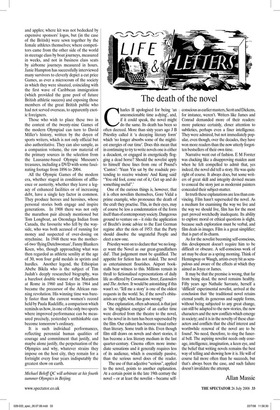The death of the novel
Charles II apologised for being ‘an unconscionable time a-dying’, and, if it could speak, the novel might do the same. Its death has been so often decreed. More than sixty years ago J B Priestley called it ‘a decaying literary form’ which ‘no longer absorbs some of the mightiest energies of our time’. Does this mean that in continuing to try to write novels one is either a decadent, or engaged in energetically flogging a dead horse? Should the novelist apply to himself these lines from one of Pound’s ‘Cantos’: ‘Yuan Yin sat by the roadside pretending to receive wisdom/ And Kung said/ “You old fool, come out of it,/ Get up and do something useful”.’ One of the curious things is, however, that it is often novelists themselves, Gore Vidal a prime example, who pronounce the death of the craft they practise. This, in their eyes, may of course be less a condemnation of the form itself than of contemporary society. Dangerous ground to venture on – it risks the application of Brecht’s ironic advice to the East German regime after the riots of 1953: that the Party should dissolve the ungrateful People and elect a new one.
Priestley went on to declare that ‘we no longer want the Novel as our great-grandfathers did’. That judgement must be qualified. The appetite for fiction has not staled. The novel as entertainment flourishes. Airport bookstalls bear witness to this. Millions remain in thrall to fictionalised representations of daily life as offered by Coronation Street, Eastenders and The Archers. It would be astonishing if this wasn’t so. ‘Tell me a story’ is one of the oldest requests in the world. So, if the novel’s obituarists are right, what has gone wrong?
One explanation, often advanced, is that just as ‘the mightiest energies’ of an earlier time were diverted from the theatre to the novel, so the novel in its turn has been superseded by the film. Our culture has become visual rather than literary. Some truth in this. Even though film still draws on novels and short stories, it has become a less literary medium in the last quarter-century. Cinema offers more immediate sensations and it generally requires less of its audience, which is essentially passive, than the serious novel does of the reader.
The use of that adjective “serious”, applied to the novel, points to another explanation. At a certain point in the late 19th century the novel – or at least the novelist – became self conscious as earlier masters, Scott and Dickens, for instance, weren’t. Writers like James and Conrad demanded more of their readers: more patience certainly, closer attention to subtleties, perhaps even a finer intelligence. They were admired, but not immediately popular, even though, over the decades, they have won more readers than the now utterly forgotten bestsellers of their own time.
Narrative went out of fashion. E M Forster was clucking like a disapproving maiden aunt when he felt compelled to admit that, yes indeed, the novel did tell a story. He was quite right of course. It always does, but some writers of great skill and integrity devised means to conceal the story just as modernist painters concealed their subject-matter.
In truth these explanations are less than convincing. Film hasn’t superseded the novel. As a medium for examining the way we live and the way we should live, film has for the most part proved wretchedly inadequate. Its ability to explore moral or ethical questions is slight, because such exploration must be verbal, and film deals in images. Film is a great simplifier; that is part of its charm.
As for the novelist becoming self-conscious, this development doesn’t require him to be difficult or obscure. A self-conscious work of art may be clear as a spring morning. Think of Hemingway or Waugh, artists every bit as scrupulous and aware of the effects at which they aimed as Joyce or James.
It may be that the premise is wrong, that far from being dead, the novel remains healthy. Fifty years ago Nathalie Sarraute, herself a ‘difficult’ experimental novelist, arrived at the conclusion that ‘the traditional novel retains eternal youth; its generous and supple forms, without being subjected to any great change, can still be adapted to the new stories, the new characters and the new conflicts which emerge in society; and it is in the novelty of these characters and conflicts that the chief interest and worthwhile renewal of the novel are to be found’. No need, therefore, to ring the funeral bell. The aspiring novelist needs only courage, intelligence, imagination, a keen eye, and the belief that writing novels remains the best way of telling and showing how it is. He will of course fail more often than he succeeds, but that’s always been the case, and such failure doesn’t invalidate the attempt.
Allan Massie


























































 Previous page
Previous page